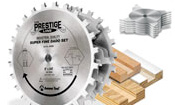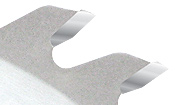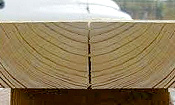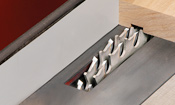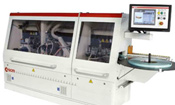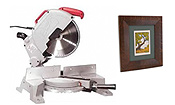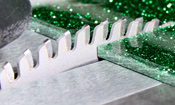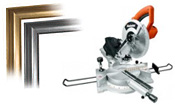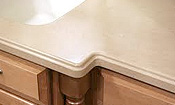Saw Blades Photo Glossary
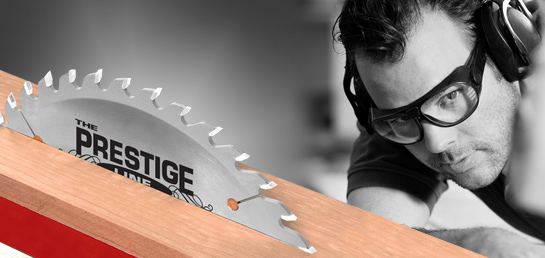

Saw Blades for Wood, Metal, Aluminum & More
Before buying saw blades, it’s good to refresh your saw blade terminology to make sure you get what you need. This saw blade glossary defines the many different saw blade terms that you need to know when you purchase, or start working with saw blades.
Browse through our woodworking videos, saw blades catalog, router bit glossary, cnc router bit glossary and shaper cutter glossary.
Lea este glosario en Español, haga clic aquí.
This saw blade is used to cut acrylic & plastic materials.
Consists of two carbide tipped saw blades with chippers of different widths in between. Can be adjusted by using different size width chippers or multiple chippers with smaller adjustments made by adding shims
Scoring sets produce clean, chip free cuts in double-sided material such as melamine and laminate.
The aluminum saw blade is used for cutting aluminum & other non-ferrous metals.


Bench Saw Blade
See Table Saw Below.


Cabinet Saw Blades
A cabinet saw blade is used with this large and heavy table saw. The mechanism incorporating the saw blade mount allows for tilt and height adjustments.
Carbide Tipped Circular Saw Blades
A saw blade with cutting edges (teeth) made from carbide. A circular saw blade is a metal disc with jagged teeth on the edge. The disk fits into a machine which causes it to spin. Used to cut wood and other materials.
Chop Saw Blades
Synonym for Miter Saw Blades.
A combination saw blade is one blade used for both ripping and crosscutting wood.
Continuous Rim Diamond Saw Blades
These saw blades are circular steel blades with diamond impregnated grit on the rim. The rims contain a mixture of metal powder, diamond powders and industrial diamonds of different sizes and qualities, depending on the different types of material to be cut. Used to cut concrete, cinderblock, marble, ceramic tile and slate.
A battery powered saw.
A crosscut or cut-off saw blade is designed to cut wood at a right angle. The cutting edge of each tooth is angled back with a slanted edge, allowing each tooth to cut through the wood like a knife.
A dado saw blade is a circular blade used to making groove cuts of different widths in wood fitting into the groove the edge of another piece of wood to make a joint.
The Demolition Saw Blade can cut through most building materials (roofing, shingles, wood, nails, sand and other non-ferrous materials).
Exclusive Ditec™ carbide tips last 2-3 times longer than standard carbide tipped saw blades. Thr laser cut saw bodies with expansion slots produce low noise levels.
Double-Sided Melamine Saw Blades
Specifically designed to cut melamine chip-free on both sides provided that your table saw fence is square to the blade and the arbor is running true.
A saw blade designed to dry-cut steel and other some other metals.
Designed for ripping hardwood and softwood, these blades cut fast and smooth. The flat top grind and the high positive hook angle reduce feed effort.
Fine Cut-Off & Crosscut Saw Blades
Ideal for cutting materials with fragile surface layers such as plywood and laminate. The high tooth count yield smooth finishes.
Heavy Duty Non-Ferrous Metal Cutting Saw Blades
Designed for cutting non-ferrous metals such as brass, copper and aluminum. The rugged design makes it suited for rough, abusive applications such as hurricane shutters.
A hollow ground saw blade is specially designed to make smooth cuts in melamine and other coated boards without the need for scoring. (A negative hook angle is particularly suitable for vertical panel saws and horizontal sliding table saws.)
An Edgebander saw blade is a replacement trim saw blade for edgebanding machines. Most machines require two blades.
Festool® Compatible Saw Blades
Saw blades that are designed to fit Festool® (and other track saw machines). These blades are comparable to the original Festool® saw blade specifications
Faming and decking blades are excellent for building decks. They offer a thin kerf design which puts less stress on your saw and wastes less material.
Cuts a wide variety of materials. General Purpose blades are designed to effectively rip and crosscut so that you can continue working without changing saw blades.
With the Glue Line Ripping saw blades you rip, then glue. There's no need for sanding or jointing after the cut.
Specially designed saw blades for exceptionally smooth cuts in melamine and other coated boards, without the need for scoring.
Saw blades designed for the Holz-Her panel saws.
Heavy duty saw blades.
Saw blades used to cut through Low Pressure Laminate (LPL) also known as Melamine.


Mandrel
See Arbor.


Metal Chop Saw Blade
A miter saw blade that can cut metal.
A miter saw blade is suspended on rollers in a metal guide which allows for making accurate crosscuts and miter cuts. Miter blades are replaceable.


Non-Ferrous Saw Blades
Saw blades that can cut metals containing little or no iron, also known as aluminum.
A panel saw blade cuts melamine, plywood, aluminum, plastic and wood sheets into sized parts. Often used for cabinets & signs.
This saw blade is used to cut acrylic & plastic materials.
A plate jointer blade is a small tungsten carbide tipped circular saw blade. It is used to cut a crescent shaped hole (a.k.a. mouth) in the opposite edges of two pieces of wood to create a biscuit joint.
These saw blade leaves a smooth, clean, chip-free finish on the top and bottom edges of plywood and laminates.
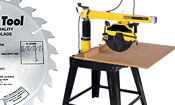

An overhead machine generally used for crosscutting. A radial arm saw is often used to cut a 90º angle, but it can swing to any position.
A rip or ripping saw blade is designed to cut into wood like a chisel. The front edges of the teeth are flat without any angle. This allows for a straight cut to be made along grain lines.
Metal disc inserted into bore of saw blade to reduce bore size.
A scoring saw blade is used on panel saws with separate scoring units for chip-free cuts on both sides of the material.
A sliding table saw blade is a circular saw blade that is mounted on an arbor. The blade sticks out through the surface of a sliding table which makes cross cutting easier and safer while providing support for the material being cut.
Blades designed specifically for sliding compound miter saws. Great for making picture frames.
Blades designed for cutting solid surface materials such as Dupont®, Corian®, Wilsonart®, Gibraltor® & Fountainhead®.
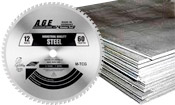

Specially designed carbide grade resists breakage & lasts longer than standard carbide or abrasive discs.


A table saw blade is a circular saw blade that is mounted on an arbor. The blade sticks out through the surface of a table, providing support for the material being cut.


A thin kerf saw blade creates a narrow cut in the material requiring less power from the machine and creating less wasted material. Excelllent for picture frames.


A trim saw blade is used in a trim saw which is a small circular saw that is easier to move around while working. Can also refer to larger saw blades with a high tooth count, which trims and sizes veneers, laminates and wood with a smooth finish.
Saw Blade Quality
Each Amana Tool® saw blade is carefully manufactured to ensure smooth, vibration free cuts with minimal feed resistance. Amana uses large European micro-grain carbide tips for repeated sharpening and extra-long tool life. Each carbide tip is precisely ground for optimum geometry and tool performance.
Amana laser-cut steel plates are carefully hardened and remain flat and true through the life of the saw blade. Laser-cut expansion slots keep the blade running true regardless of the working conditions. And the copper plugs keep turbulence and noise to a minimum. Large gullets efficiently remove saw dust and chips from the kerf to keep resistance to a minimal.
Amana Tool industrial saw blades are among the finest produced anywhere.
Browse through our woodworking videos, saw blades catalog, router bit glossary, cnc router bit glossary and shaper cutter glossary.
Lea este glosario en Español, haga clic aquí.
Back to top of page.




